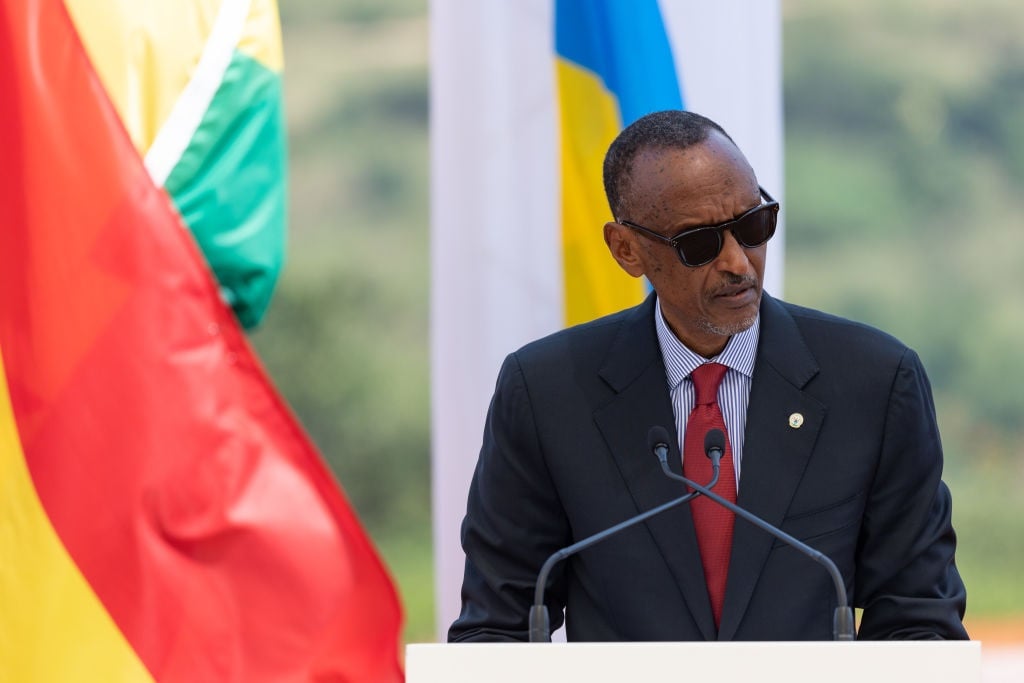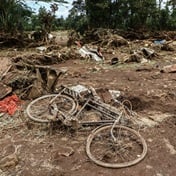
- Rwandan President Kagame spoke of the failures of France and the UN during the Rwandan genocide.
- During anniversary events, he told the story of his cousin, a UN worker betrayed by a colleague - who remained in the employ of the UN.
- France has accepted its part in failing to stop the genocide.
Rwandan President Paul Kagame has spoken about the West's failures, particularly those of the United Nations (UN) and France, in the Rwandan genocide of 1994, which started 30 years ago this week.
Kagame told of how one of his relatives was killed by militias when her colleague at the UN sold her and others out.
Callixte Mbarushimana (60) worked for the UN in Rwanda in the early 1990s and also served in Angola and Kosovo.
During the Rwandan genocide, he was alleged to have participated in the murder of 32 people, including his colleagues.
One of them was Kagame's cousin, Florence Ngirumpatse, who was the United Nations Development Programme (UNDP) director of personnel.
Mbarushimana was not prosecuted for his alleged role in the Rwandan genocide, but the International Criminal Court (ICC) in The Hague indicted him in September 2010 for crimes against humanity and war crimes allegedly committed in the Democratic Republic of the Congo in 2009 as a member of the rebel group Democratic Forces for the Liberation of Rwanda (FDLR).
He was released due to inadequate evidence and is understood to be a resident in France.
President Kagame on the realities of who was prioritized by peacekeepers during the 1994 Genocide Against the Tutsi. #Kwibuka30 pic.twitter.com/6hzi2Wv2EK
— Presidency | Rwanda (@UrugwiroVillage) April 8, 2024
Kagame's pain
In his address at the Kwibuka 30 ceremony, Kagame said he had "a personal story which I usually keep to myself".
Ngirumpatse had worked for the UN for more than 15 years, he said.
"After the genocide started, she was trapped in her house near the Camp Kigali army barracks, with her niece, other children and neighbours, around a dozen people in total.
"The telephone in Florence's house still worked, and I called her several times using my satellite phone. Each time we spoke, she was more desperate. But our forces could not reach the area," he said.
READ | How South Africa's transition from apartheid overshadowed the Rwandan genocide in 1994
In Rwanda, there's resentment towards the UN for its failure to stop the genocide or rescue those who were under attack.
Kagame experienced that first-hand when a top UN commander didn't rescue his cousin.
"When the commander of the UN peacekeeping mission, General [Roméo] Dallaire, visited me where I was in Mulindi, I asked him to rescue Florence. He said he would try," said Kagame.
But Dallaire, who went on to have a political career back home in Canada, didn't live up to his promise in that ill-fated UN peacekeeping period of 1994.
"The last time I talked to her, I asked her if anyone had come. She said no, and started crying. Then she said, "Paul, you should stop trying to save us. We don't want to live anymore anyway.
"And she hung up. At that time, I had a very strong heart. But it weakened a bit because I understood what she was trying to tell me," said a Kagame filled with emotion.
After a month of torture, on 16 May, Florence was killed, as was her family, "except for one niece, who managed to escape, thanks to a good neighbour."
Searching for answers
Kagame would later establish that Florence and other Tutsi colleagues were "betrayed" by a fellow employee at the UN – who remained at the organisation afterwards.
"Witnesses remember him celebrating Florence's murder the night after the attack. He continued his career with the United Nations for many years, even after evidence implicating him emerged," he said.
"I asked General Dallaire what had happened. He said that his soldiers encountered a militia roadblock near the house, and so they turned back, just like that," he said.
Dallaire had told Kagame about a directive from the United States ambassador to Rwanda that diplomats and foreign civilians had to be evacuated by road to Burundi.
His cousin should have been in that group.
Kagame said he was not angry at Dallaire, a "good man who did the best that could be done in the worst conditions imaginable, and who has consistently borne witness to the truth, despite the personal cost."
French double standards
Last week French President Emmanuel Macron said Paris didn't have the will to halt the massacres in Rwanda.
In retrospect, France could do so as the leader of "Opération Turquoise" a UN mission in Rwanda during the genocide period.
According to former Rwandan ambassador to France Jacques Bihozagara, the operation was aimed only "at protecting genocide perpetrators, because the genocide continued even within the Turquoise zone."
Macron didn't attend the Kwibuka 30 events, but former French president Nicolas Sarkozy was there in the front seats of VIP delegates when Kagame spoke about France's role.
Kagame said the French sent a letter to him through Dallaire, warning his Rwandan Patriotic Front (RPF) to stay away from a region occupied by France because they would be killed.
ALSO READ | Honouring memories through art: Young Rwandan illustrators keep the memory of genocide victims alive
"The message said that we would pay a heavy price if our forces dared to try to capture the town of Butare, in the southern part of our country.
"General Dallaire gave me some additional advice. He warned me that the French had attack helicopters, and every kind of heavy weapon you can imagine, and therefore were prepared to use them against us if we did not comply," Kagame said.
"I asked Dallaire whether French soldiers bleed the same way ours do; whether we have blood in our bodies?
"Then I thanked him and told him he should just go and get some rest and sleep, after informing the French that our response would follow. And it did," he said.
The RPF took Butare soon after.
"Within weeks, the entire country had been secured, and we began rebuilding. We did not have the kind of arms that were being used to threaten us, but I reminded some people that this is our land, this is our country. Those who bleed will bleed on it," he added.
The News24 Africa Desk is supported by the Hanns Seidel Foundation. The stories produced through the Africa Desk and the opinions and statements that may be contained herein do not reflect those of the Hanns Seidel Foundation.




 Publications
Publications
 Partners
Partners























